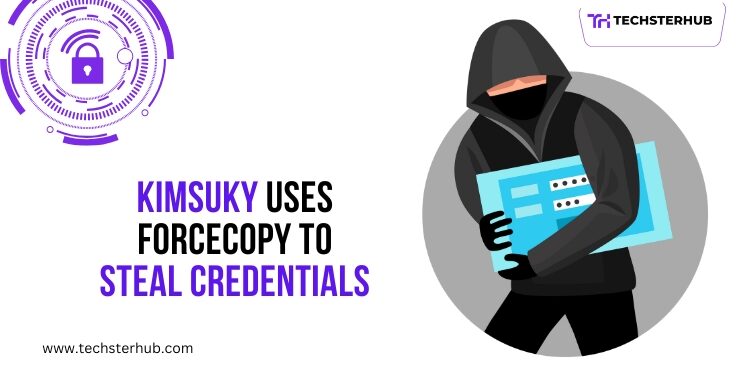The cybersecurity threat landscape keeps evolving with new dangers emerging, including the hacking group Kimsuky which operates under the control of North Korea. The hacking group uses forceCopy malware to extract usernames and passwords stored by web browsers. By obtaining these stolen credentials hackers gain access to critical personal and business data which results in severe damages for the victims.
This article dives into Kimsuky’s operations and threat capabilities, discusses its use of forceCopy malware and explains its potential impact on individuals and organizations. The article will provide information on protecting yourself from these cyber threats.
What is Kimsuky?
The hacking group Kimsuky from North Korea operates under the aliases Velvet Chollima and Black Banshee and maintains activity over multiple years. The North Korean government provides support to this cyber espionage group. Espionage involves the secret collection of information from another nation or organization for political or military objectives.
Kimsuky has focused its cyber-attacks on numerous organizations and individuals throughout South Korea, the United States, and Japan. The group focuses on obtaining confidential data from government agencies as well as research organizations and businesses operating in defense technology and financial sectors.
The group employs multiple strategies to gain system access which involve phishing email distribution, software vulnerability exploitation, and malware deployment to extract data. The discovery of forceCopy malware revealed the extreme danger and complexity of their attacks.
What is forceCopy Malware?
Malware represents software that targets computers, smartphones, and other devices to cause damage and extract information. Kimsuky utilizes forceCopy as a malicious program to infect systems and steal valuable data. After forceCopy malware gets installed on a device it can execute multiple harmful functions.
- ForceCopy targets browser-stored credentials as its primary mission to extract usernames and passwords saved by users in Google Chrome or Mozilla Firefox.
- The malware collects information about the victim’s computer system including active files and running programs which enables hackers to develop advanced attack strategies.
- Attackers receive the stolen data which they utilize to gain unauthorized access to additional accounts or sell it on the dark web and the stolen credentials help them attack people with similar passwords.
How Does Kimsuky Deploy the forceCopy Malware?
Kimsuky deploys malware such as forceCopy through innovative and strategic methods. Here’s how they typically do it:
- Phishing Emails: The Kimsuky group frequently executes phishing attacks to deceive individuals into installing their malware. Hackers execute phishing attacks by sending fraudulent emails that mimic trusted entities such as banks or businesses. When users click the embedded links or attachments in these emails, they unknowingly trigger malware downloads onto their devices.
- Exploiting Software Vulnerabilities: Kimsuky enters systems by exploiting flaws within software programs or web browsers. Hackers install forceCopy on the victim’s system without their knowledge once they identify a software vulnerability.
- Remote Access Tools: Kimsuky has been documented using remote access applications such as TeamViewer which functions as a legitimate tool for accessing computers remotely. Through malicious use of remote access tools hackers can gain control of victims’ computers from any location.
The malware initiates its data theft operation which targets browser-stored credentials immediately after installation.
Why is This a Big Threat?
ForceCopy malware usage by Kimsuky represents a major threat for multiple reasons.
- If hackers manage to obtain your browser-stored passwords then they will gain entry to your email and social media profiles as well as your bank accounts and shopping sites.
- Kimsuky targets government agencies and research organizations to collect sensitive information which serves their espionage activities and provides them with a strategic edge in political and military arenas.
- Credential stuffing attacks make use of stolen login credentials which hackers attempt to use on multiple websites to gain unauthorized access.
- ForceCopy is a type of stealthy malware that remains difficult to detect because it runs quietly without triggering antivirus alerts.
How Can You Protect Yourself?
You can protect yourself against malware such as forceCopy by following multiple security steps.
- Exercise caution when handling emails by avoiding attachments and links from unfamiliar senders and verify the legitimacy of the sender’s email address.
- To secure your accounts create strong passwords with letters, numbers, and symbols for each website and use a password manager to maintain them.
- MFA strengthens account security by requiring a second verification step which blocks access if only the password is known.
- Regularly update your browser and antivirus software along with other programs because updates provide security patches that help fix vulnerabilities which hackers can use.
- A dependable antivirus program should be installed on your device because it can identify many widespread threats even though it might miss certain malware types.
- Learn about new cybersecurity threats and device protection methods to improve your readiness against cyberattacks.
Conclusion
The forceCopy malware developed by the North Korean hacking group Kimsuky demonstrates the increasing complexity of cyber threats in the modern digital environment. Through the theft of browser-stored credentials Kimsuky gains access to valuable personal data and executes espionage operations. Our increasing dependence on the internet makes it crucial to understand these threats while taking appropriate protective measures.
The risk from malware such as forceCopy decreases when users practice email caution and utilize strong passwords along with multi-factor authentication while maintaining updated software. Cybersecurity requires everyone to take part because the proper knowledge enables us to take measures to protect our online safety.











